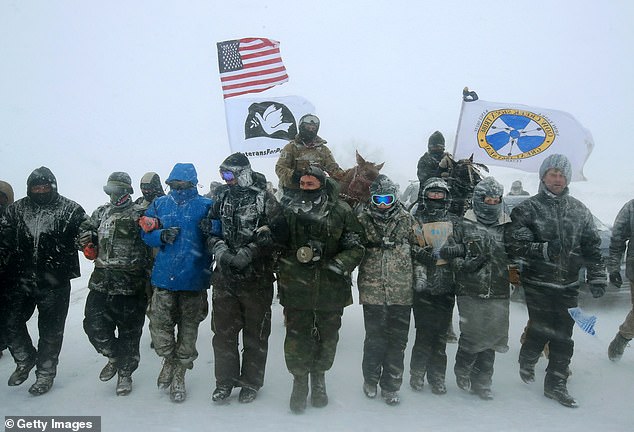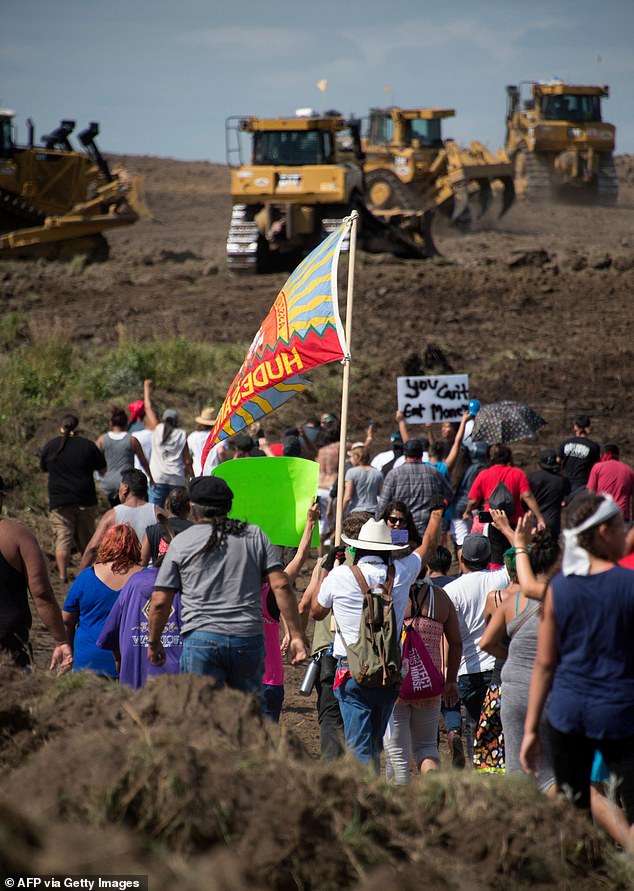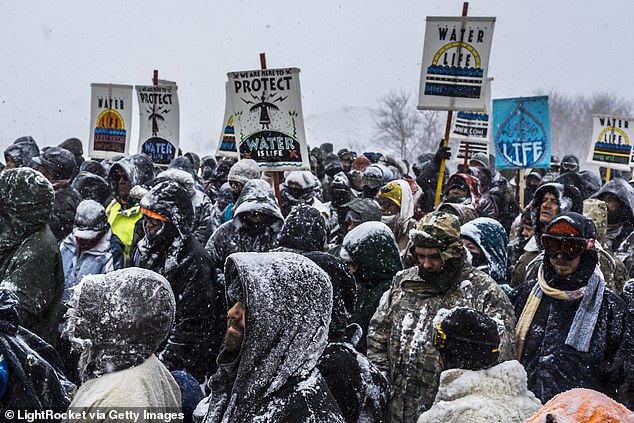Standing Rock activist says she regrets the ultra-liberal protest eight years on: ‘I thought I was a journalist… I wasn’t’
A former left-wing environmentalist, who now works for an independent media company The free pressrecently reflected on her time covering the Dakota Access Pipeline protests for the progressive social media company NowThis News.
Lucy Biggers, 34, wrote for the outlet that she regrets fanning the intensely emotional flames of the DAPL protest with manipulative, one-sided videos that it was her job to create and promote.
“I called myself a journalist, but I was actually an early social media influencer who expressed a very specific point of view,” she wrote.
Now she says she regrets helping an underdeveloped, left-wing take on the issue go viral.
The protest against the Dakota Access Pipeline lasted nine months at the end of President Obama’s second term. The Standing Rock Sioux Tribe and thousands of activists gathered in North Dakota to protest the construction of a crude oil pipeline

Former NowThis News social media journalist/influencer Lucy Biggers wrote for the Free Press about the regret she feels for helping the one-sided protest go viral
In late 2016, with just weeks to go before the election pitting Hilary Clinton against Donald Trump, Biggers wrote that she had made a video of actress Shailene Woodley speaking passionately about protest, editing the most impactful lines of her speech and the whole set to ‘sincere’ and ‘somber’ music.
The video was viewed millions of times in the following weeks, drawing increasing attention to the North Dakota protest site that became known as Standing Rock.
“I’m calling out to everyone in this room tonight: show up. Don’t just tweet about it. Don’t just feed off the fact that I got arrested. Go to Standing Rock. Go to Standing Rock,” said a glamorous and visually emotional Woodley.
She was flanked on either side by members of the Standing Rock Sioux tribe as she spoke at the Environmental Media Association award reception.
As the clip went viral, and then even more viral, Biggers said she began to feel a “little pit of fear” in her stomach that “maybe this issue wasn’t as black and white as I had portrayed it to our audience.”
The thought, she said, was largely suppressed at the time by the belief that her “side” was fueled by moral conviction, while the other side was fueled only by corporate greed.
“Thinking back, I can now see that the story played on the sense of ‘white guilt’ I had developed working in such a left-wing news environment,” Biggers wrote.
“By highlighting the marginalized voices of these Native American activists, I was able to redeem my privilege,” she added, further noting that she did not want to alienate her progressive-minded viewers and followers, or her friends and colleagues, by to present in any form. of counterarguments.

Biggers, now a wife and mother with a more “realistic” perspective, says she was a little apprehensive about presenting a one-sided argument about the protesters and their cause.

The DAPL protests continued for months, culminating in an announcement by the outgoing Obama administration that work on the pipeline would be halted.

Actress Shailene Woodley became a well-known face of the Standing Rock protest after being involved in the issue for many months and at one point even being arrested
In December 2016, outgoing President Barack Obama ordered construction of the DAPL to halt. which the demonstrators recorded as a clear victory for their team.
But Donald Trump would soon be sworn in and almost immediately order pipeline construction to restart.
But the protesters had already left their camp by then, leaving behind forty-eight million pounds of trash, which would cost North Dakota taxpayers $1 million to clean up, Biggers wrote.
She said she chose not to highlight the cleanup efforts at the time because she did not want to “undermine the illusion” of the protest that had “inspired the world.”
It wasn’t until the young social media journalist quit her job at NowThis News and started consuming different types of news outlets and books about climate change that she came to realize that “the environmental causes I had so breathlessly championed were far more complicated than right versus good.” evil.’
The Dakota Access Pipeline has been in operation for years now and has done a lot of good for its home state and the rest of the country.
It transports more than half a million barrels of crude oil per day from North Dakota to an oil tank farm in Illinois, where it can be stored and further distributed.
Moreover, Biggers wrote, “the likelihood of the pipeline plundering Lake Oahe is extremely remote.”
The Standing Rock Sioux Tribe initially objected to the pipeline’s construction because it would be routed under Lake Oahe, which the tribe considers sacred water.
Biggers now points out that several Native American tribes in North Dakota even rely on the pipeline to transport oil drilled on their land.

Woodley rallied her fans and followers to join her at the protest site in North Dakota

By the time protesters left in February 2017, they had left behind 48 million pounds of trash, which North Dakota taxpayers had to pay to clean up.
Finally, Biggers says that now, as a wife and mother, she has gained a “more realistic” understanding of “the world we all share.”
‘I hesitated to talk about my new, more complex views on energy, climate and sustainability because I was too afraid to face the inevitable backlash.
“I have seen in recent years how the climate movement has become increasingly radical, defacing famous works of art, blocking traffic and even ambulances, and tying their hands to the roads,” she wrote, adding that climate activists have begun to focus on issues as the ‘liberation of Palestine’ and ‘the dismantling of capitalism’, which seem to bear little relation to the maintenance and reduction of CO2 emissions.
She concluded her piece by saying that she has been hesitant to speak publicly about her newly developed centrist views, but feels she cannot wait any longer, especially for fear that people “with less radical ideas” might have difficulty countering the ‘irrational, destructive goals’ of vocal activists.
